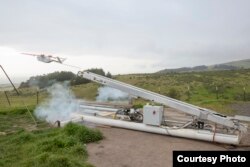Small, unmanned airplanes will take to the skies of Rwanda later this year on a life-saving mission: to carry cardboard boxes packed with medical supplies for airdrop at remote clinics.
A new initiative by several U.S. companies could help improve the lives of thousands of people around the world through the use of drones.
The UPS Foundation, the charitable arm of the global shipping giant, is working with California-based Zipline, which manufactures the drones. The medical supplies are provided by the GAVI Vaccine Alliance.
The partnership is a natural for UPS, according to The UPS Foundation president, Eduardo Martinez.
"UPS operates in so many different countries, over 220 countries and territories,” he said. “So when a disaster occurs … someplace, it impacts us in a very profound way. ... So we've always lent our assets, our resources, our people and expertise to help these communities rise above these crises."
Simple, safe delivery
When roads are blocked by floods, landslides or hostile checkpoints, often the only way to get vital medicine and supplies to remote areas is by air, no pilot needed.
The fixed-wing drones can carry 1.5 kilograms of cargo and travel up to 120 kilometers. They fly on a pre-determined route, and once they've delivered their package, they return to base.
The idea behind the project is to make ordering medicine as simple as texting a friend.
Health workers request blood or other supplies by text message, then workers at the delivery hub pack up the order in a padded box, place it into the drone's cargo hold, scan a code that tells it where to go, and the order is on its way.
Zipline has contracted with the Rwandan government to deliver blood to transfusion centers, with plans to expand the program to include vaccines and other medicines. The partners will study the pilot operation to determine the best way to do that, and to help countries around the world launch similar efforts.
Drone data
In addition to providing a vital service, the project will provide Zipline and UPS with data about the safety and reliability of drone delivery. That could have an impact on whether or not the Federal Aviation Administration will allow drone deliveries of all kinds of products in the United States.
Companies like Amazon and Google hope to introduce that option for their customers.
But Martinez is looking ahead to other applications for the service, besides fulfilling product orders.
"Whether it's a sudden onset disaster to survey where people may be trapped, to communities that are involved in conflict zones or continue to have poor infrastructure or even have a sudden emergency,” he said. “So you can imagine, just in medical emergencies, scenarios where this could apply in the first-world rural communities to, again, emerging and frontier markets, as well."
And, he points out, sending a drone in that scenario costs a small fraction of what an airdrop by helicopter would cost.
Martinez expects the medical-supply service be underway in August.







